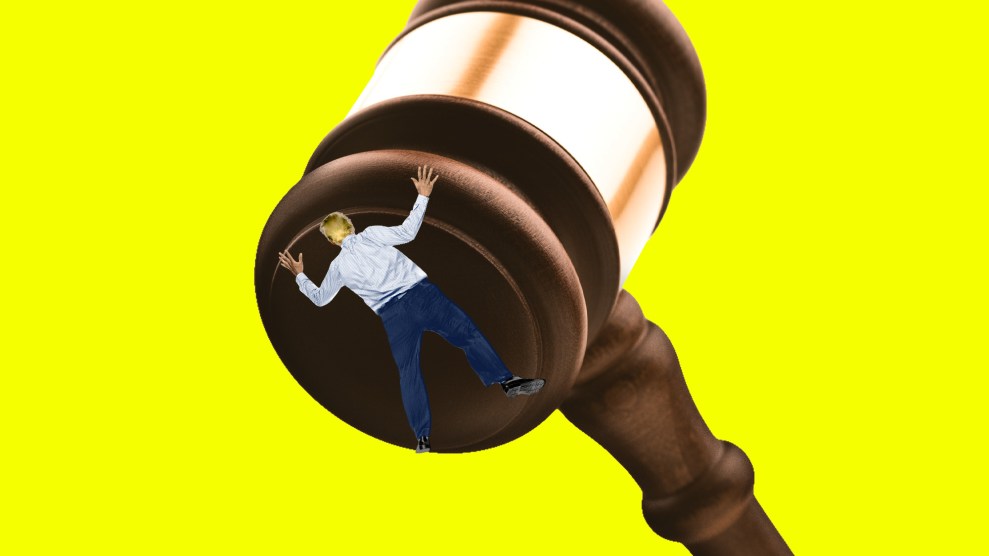
Mother Jones illustration; Getty; Joshua Lott/AFP/Getty
Donald Trump is going to be spending a lot of his time in courtrooms this year—and not just fighting Manhattan District Attorney Alvin Bragg’s newly-filed charges. The recent indictment has raised legitimate questions about how Trump would manage the roles of being both a presidential candidate and a criminal defendant. But the reality is that Trump was already going to have an incredibly busy schedule fending off legal threats. There are as many as 40 other lawsuits and investigations into his behavior before, during, and since his time in the White House.
And three of them—all major, all potentially extremely costly—are set to go to trial at some point in the next ten months. The last of the cases will kick off in early 2024, and all will occur as Trump is trying to get his 2024 presidential campaign into high gear. All will be heard in courthouses within one block of each other in southern Manhattan, and by the end, each case will likely have cost millions of dollars, thousands of billable hours, and weeks of time in front of empaneled juries. Trump will not necessarily have to appear in the courtroom for every hearing in every case—he will be paying attorneys millions to do most of it for him—but the former president is going to have a legally busy, and legally perilous, year ahead—whether Bragg’s charges stick or not.
For starters, there is the lawsuit filed by writer E. Jean Carroll who has accused Trump of raping her in a Bergdorf-Goodman dressing room in the mid-1990s. Carroll has filed both a defamation lawsuit—alleging that Trump had disparaged her when she first made her accusation saying, by saying, among other things, that Carroll was “not my type”—and a civil lawsuit accusing Trump of battery for the alleged assault. The defamation lawsuit has been temporarily put on hold. But the battery lawsuit is moving forward—made possible by a new New York law that makes it easier for adult survivors of sexual assault to make civil claims against their alleged attackers. The trial will begin April 25 in a federal courtroom a block from the New York City courthouse where Trump will be arrested and fingerprinted on Tuesday in Bragg’s case.
The testimony in the Carroll case is expected to last a week and judging by the flurry of pre-trial motions that have been filed back and forth for months, it has enormous potential to be ugly for Trump. Win or lose, it seems likely to be a high-profile platform for allegations that Trump routinely made aggressive, uninvited sexual advances toward women fairly regularly. Attorneys in the case, for example, are waiting for the judge to rule on whether depositions from other women who say Trump sexually assaulted them should be admissible. They are attempting to demonstrate that his sexual advances on women constituted a “signature crime”—meaning Trump had a modus operandi of preying on women. Never a positive description for a presidential candidate.
Then, there is the massive $250 million civil lawsuit that New York attorney general Letitia James filed against Trump last fall. It’s a sprawling case that accuses Trump of systematically manipulating the values of his various properties. When using them as collateral to get loans and insurance coverage, he would pump up their value, and then drastically undervalue them when it came time to pay taxes. James’ office has been sparring with Trump for nearly four years in the matter, but it will all come to a head on October 2, when the case will go to a full jury trial.
Trump’s attorneys have fought to delay that case—arguing mainly that they haven’t been given enough time to process the enormous amount of discovery and evidence that James’ office has produced. But the New York Supreme Court judge overseeing that case has largely rejected their complaints and earlier this week confirmed the trial will happen in October. Trump’s only option to avoid the publicity and airing of his financial shenanigans may be to settle the case—which would likely involve having to pay some fine (though less than the $250 million James is asking for) and acknowledging some guilt. Publicly, Trump has mocked James, and his attorneys have blustered in court that her investigation is nothing but a politically-motivated witch hunt. But James says Trump’s attorneys have approached her office seeking a settlement that would keep the case out of a courtroom.
Next January, Trump and his lawyers will go from the New York Supreme Court building, where James’ case will be heard, to the building next door, where Carroll’s case was heard, in order to battle another potentially costly lawsuit. This one is a class-action lawsuit filed over Trump’s involvement, starting in 2008 at the height of his Apprentice fame with the multi-level marketing company ACN.
Trump promised potential customers that he had “done the research” and urged them to “trust me”: there would be no risk in getting involved with ACN’s products. That, of course, was not true. As many as 200,000 people did pay hundreds of dollars to buy into ACN’s marketing scheme. Plaintiffs in the case say they were duped into paying hundreds of dollars to attend seminars and promotional events and wasted money trying to sell what turned out to be an unsuccessful product—and, they claim, they spent that money because Trump was persuasive in his argument that the company and the product were winners. Trump was paid nearly $9 million to appear at promotional events and make videos touting the company’s product—a telephone ACN billed as “revolutionary” that would allow video-chatting as well as regular phone calls.
Trump has since defended his role in the business, saying it amounted to “puffery” that no one reasonably could have believed. If Trump loses, the damages are estimated at around $5 million—although more ACN customers could join and take that figure higher. As with the Carroll case, even if Trump wins, the case can potentially get ugly, with Trump’s own lawyers having to depict him as an unreliable and untrustworthy pitchman who no one would take seriously—awkward at any time, but especially during a presidential run.
And those are just the cases going to trial in New York City over the next year, likely in the same time frame as a potential trial in the Bragg case is scheduled. Trump, of course, remains the target of a grand jury investigation in Georgia over his attempts to meddle in the 2020 election results and is under investigation by a Department of Justice special counsel over his role in removing secret documents from the White House and storing them, largely unsecured, at his Mar-a-Lago resort.













